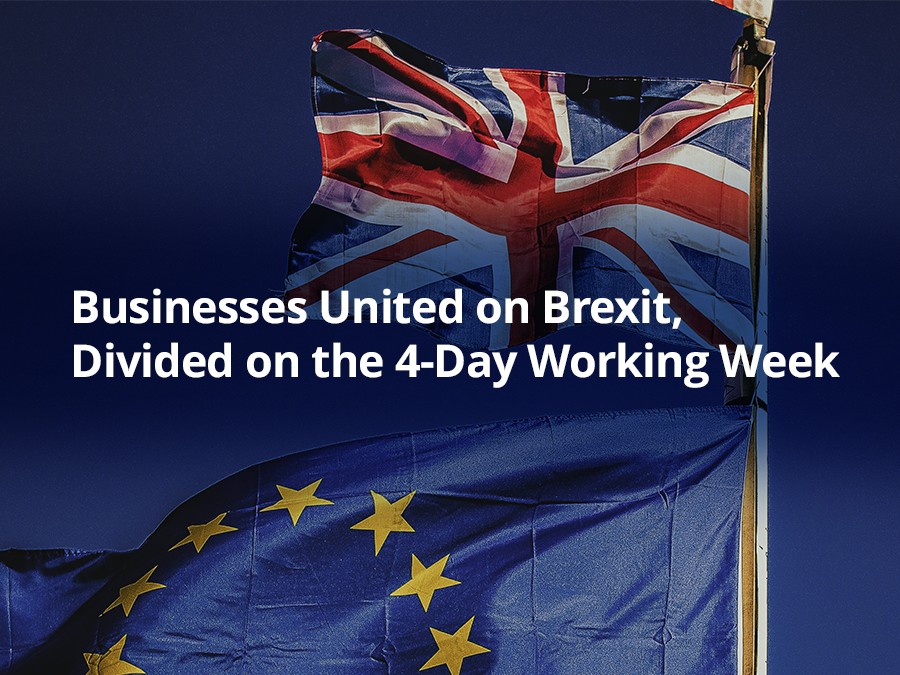A 4-day work week, Brexit and the cost-of-living crisis. These are some of the biggest issues facing Businesses in the UK, according to a recent survey we conducted.
Only 4.5% of organisations believe Brexit has been good for their business. Equally, over half would consider implementing a 4-day work week following the successful completion of the current trial.
These are just some of the results we conducted that investigated the most pressing issues for businesses currently.
We have a diverse customer base made up by a range of sectors and business sizes. This gives us an insight into overall trends and the ability to drill down into issues affecting small businesses or other heavily impacted sectors.
Almost 2,400 organisations responded to our survey to give us the inside track on their biggest concerns. Some of the results might surprise you.
Brexit is bad for business
Across all business sectors and sizes, Brexit is viewed negatively. Medium-sized businesses view Brexit the most adversely as just 1.48% of companies believe it has been good for their business. Small businesses view Brexit slightly less negatively, although this percentage only sits at 5.63%.
A disrupted supply chain was cited by almost 50% of businesses as the main reason for Brexit’s negative impact. Decreased confidence and goodwill towards UK businesses due to Brexit was specified by a third of survey responders. Small businesses also commented that they’re being most acutely affected by export tariffs.
A huge 80% of all businesses said there were no benefits to Brexit at all. When split by sector the results are even more damning. Nobody within the arts, retail, education, hospitality, property or healthcare sectors believed Brexit has been good for their business.
Given its economic effects, it’s unsurprising that so many businesses feel negatively towards Brexit.
One in five small businesses are now no longer able to trade in the EU as a result of Brexit-induced barriers, a separate study recently found. Disrupted supply chains continue to affect stock levels and manufacturing capabilities, leaving many UK companies in a difficult position.
For small businesses that are focusing on local customers as a result of Brexit-driven restrictions on international trade, print marketing can be a cost-effective and powerful way to increase brand awareness. As well as printing services, we offer advice on how to write and how to design your product.
Attitudes towards the 4-day work week are mixed
The UK’s 4-day work week trial, which has 73 businesses with over 3,300 employees taking part, has passed its halfway mark. Results have been overwhelmingly positive and it’s looking increasingly likely that this could become a reality for some UK employees.
A huge 86% of the businesses taking part in the trial, ran by 4-Day Week, said they’ll make the 4-day work week permanent.
But businesses that aren’t taking part in the trial are mixed on whether or not they’d adopt it. Overall, attitudes towards the concept are positive with 70% of respondents saying they believe it’s a good idea. Organisations with more than 250 employees were the most likely to say it isn’t a good idea at nearly 20%.
However, when it comes to adopting the scheme, responses become mixed. This figure drops to 50% when businesses were asked if they’d consider employing it, with over a third saying they wouldn’t consider it. Yet, this shoots back up to 75%, if organisations were guaranteed no loss of earnings.
Loss of output is the biggest fear for smaller businesses, with around a third citing this as their main concern. Across businesses of all sizes, government funding would be the biggest incentive to implement the 4-day work week, with almost half of them saying this as their primary motivation.
Interestingly, almost 50% would be more tempted to support the scheme through widespread adoption across the public sector and large businesses. This suggests that if a 4-day work week is used broadly by a majority of businesses, the rest may need to follow suit in order to compete for workers.
In positive news for employees, fewer than 10% of businesses of any size would adopt the policy with a 20% drop in their workers’ salaries. This removes some doubt for workers who may be concerned about a loss of personal earnings as a compromise, especially during a cost-of-living crisis.
The single biggest issue
The cost-of-living crisis was named the biggest threat by over 80% of businesses in our survey. With inflation and the energy crisis driving up prices for companies and consumers alike, organisations are feeling the pinch and are expecting this to continue for the foreseeable future.
Nearly three years on from the beginning of the pandemic, businesses are still feeling the knock-on effects of COVID. Over a third are saying that this is still a pressing threat. Brexit follows closely in third, with globalisation and climate change completing the top five.
Where do we go from here?
Businesses of all sizes are facing a myriad of issues that are threatening their livelihoods. However, it’s not all bleak news. The 4-day work week, while concerning to many, presents a lot of positives to businesses and employees alike. Organisations taking part in this trial have reported improved productivity. Their employees are enjoying a better work-life balance which has proven to be key in improving employee retention and loyalty.
The cost-of-living crisis has compounded many issues already affecting businesses and consumers. In order to overcome these issues, businesses must be strategic. If your prices are rising because of the cost of your labour and resources, be honest with your customers. While it might be tempting to cut costs in areas like marketing, strengthening in these areas will become more vital to compete in a crowded market.
Our previous survey revealed that almost three-quarters of businesses were planning to increase their marketing spending in 2022. This is despite the economic uncertainty that lingered around the New Year.
It’s clear that businesses are seeing the value in marketing, whether that’s print marketing through flyers and leaflets, digital marketing or a blend of both.
If you’re wondering how flyers can boost your business read why flyers are still effective here.









